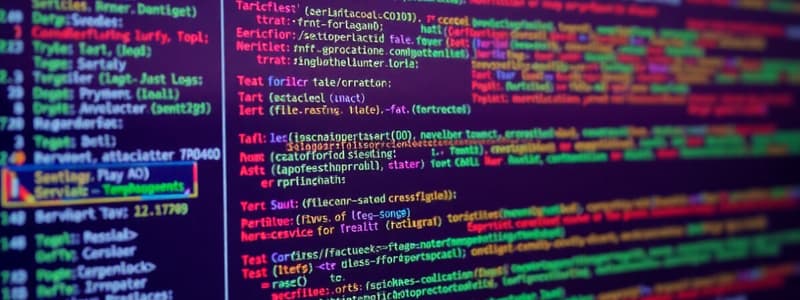Podcast
Questions and Answers
What is the primary purpose of the compilation process?
What is the primary purpose of the compilation process?
- To convert high-level code into machine code (correct)
- To provide detailed error messages
- To compile code during execution
- To manage directives and prepare the code
Which stage of the compilation process turns preprocessed code into assembly code?
Which stage of the compilation process turns preprocessed code into assembly code?
- Preprocessing
- Linking
- Assembly
- Compilation (correct)
Which of the following refers to a program that performs the compilation process?
Which of the following refers to a program that performs the compilation process?
- Compiler (correct)
- Loader
- Debugger
- Interpreter
What is a characteristic of the GCC compiler?
What is a characteristic of the GCC compiler?
What does 'Just-in-Time' (JIT) compilation refer to?
What does 'Just-in-Time' (JIT) compilation refer to?
Which compiler is specifically designed for Windows operating systems?
Which compiler is specifically designed for Windows operating systems?
What is one of the key benefits of the compilation process?
What is one of the key benefits of the compilation process?
What is the role of error checking in the compilation process?
What is the role of error checking in the compilation process?
What is the main purpose of execution in the context of compiled programs?
What is the main purpose of execution in the context of compiled programs?
Which of the following best describes the compilation process?
Which of the following best describes the compilation process?
What occurs during the initialization phase of execution?
What occurs during the initialization phase of execution?
What is a primary distinction between local execution and online compilers?
What is a primary distinction between local execution and online compilers?
Which type of error occurs when a program runs but produces incorrect results?
Which type of error occurs when a program runs but produces incorrect results?
What does debugging primarily aim to achieve?
What does debugging primarily aim to achieve?
Which of the following is NOT considered a common issue during execution?
Which of the following is NOT considered a common issue during execution?
What action does the operating system perform when a program requires dynamic libraries?
What action does the operating system perform when a program requires dynamic libraries?
Flashcards
Compilation
Compilation
Converting high-level programming language code (like C++) into machine code a computer can run.
Compiler
Compiler
A program that performs the compilation process.
GCC
GCC
GNU Compiler Collection, a common C++ compiler.
Clang
Clang
Signup and view all the flashcards
MSVC
MSVC
Signup and view all the flashcards
Ahead-of-Time (AOT) Compilation
Ahead-of-Time (AOT) Compilation
Signup and view all the flashcards
Just-in-Time (JIT) Compilation
Just-in-Time (JIT) Compilation
Signup and view all the flashcards
Compilation Importance
Compilation Importance
Signup and view all the flashcards
Execution
Execution
Signup and view all the flashcards
Execution Flow
Execution Flow
Signup and view all the flashcards
Types of Execution Environments
Types of Execution Environments
Signup and view all the flashcards
Runtime Errors
Runtime Errors
Signup and view all the flashcards
Logical Errors
Logical Errors
Signup and view all the flashcards
Debugging
Debugging
Signup and view all the flashcards
Syntax Errors
Syntax Errors
Signup and view all the flashcards
Resource Leaks
Resource Leaks
Signup and view all the flashcards
Study Notes
Problem Solving in Computing (PRL1013)
- Course focuses on developing solutions in computing.
- Key learning units include coding, compilation, execution, and debugging techniques.
Subtopics
- Coding
- Compilation
- Execution
- Debugging
Part 1.2: Compiler, Execution, & Debugging
Compilation
- Definition: The process of converting high-level programming language code (like C++) into machine code that computers understand.
- Purpose: To translate human-readable code into a format computers can process.
- The Compilation Process: Consists of stages:
- Preprocessing: Manages directives (e.g., #include, #define).
- Compilation: Transforms preprocessed code into assembly code.
- Assembly: Converts assembly code into machine code, creating an object file.
- Linking: Combines object files with libraries to produce a final executable file.
Compiler
- Definition: A program or tool that executes the compilation process.
- Analogy: Like a translator, converting one language (e.g., C++) to another (e.g., machine code).
Common C++ Compilers
- GCC (GNU Compiler Collection):
- Supports multiple languages (C, C++,...).
- Cross-platform compatible.
- Open-source and community-driven.
- Clang:
- Known for speed and efficiency.
- Focuses on C, C++, and Objective-C.
- Provides detailed error messages.
- MSVC (Microsoft Visual C++):
- Optimized for Windows.
- Integrates with Visual Studio.
- Offers robust tools for Windows application development.
Types of Compilation
- Ahead-of-Time (AOT): Compiles code before execution.
- Just-in-Time (JIT): Compiles code during execution.
- Interpretation: Executes high-level code line by line.
Importance of Compilation
- Error Checking: Identifies syntax and type errors.
- Optimization: Improves code performance.
- Portability: Enables high-level code to run on various hardware.
Execution
- Definition: The process of running a compiled program on a computer's processor to perform tasks and produce results.
- Purpose: Converts compiled machine code into actions (like calculations, data processing, and displaying results).
Execution vs. Compilation
- Execution: Runs compiled machine code. Involves dynamic resource management during code running.
- Compilation: Translates code into machine code before execution. Focuses on the correctness of the syntax before running.
Execution Flow
- Loading: Operating system loads the executable file into memory.
- Linking: If dynamic libraries are needed, the operating system links them during runtime.
- Initialization: Program initializes variables and sets up the execution environment.
- Execution: CPU executes instructions sequentially.
- Termination: Program finishes execution and releases resources.
Types of Execution Environments
- Local Execution: Running on personal or server computers.
- Online Compilers: Web-based environments that compile and execute code.
- Embedded Systems: Running programs on specialized hardware.
Common Execution Issues
- Runtime Errors: Errors during execution.
- Logical Errors: Program runs without crashing but produces incorrect results.
- Resource Leaks: Failure to release allocated resources, causing performance issues.
- Performance Bottlenecks: Inefficient algorithms slow down execution.
Debugging
- Definition: Process of identifying, isolating, and fixing errors in a program.
- Purpose: Improve program reliability and performance.
Common Types of Bugs
- Syntax Errors: Mistakes in code structure preventing compilation.
- Runtime Errors: Errors occurring during program execution.
- Logical Errors: Mistakes in logic producing incorrect results.
Debugging Techniques
- Print Statements: Tracing variable values.
- Breakpoints: Pausing execution and investigating variables.
- Step Execution: Executing code line-by-line to observe behavior.
Best Practices for Debugging
- Understanding the Code: Familiarize yourself with the code structure.
- Reproducing the Bug: Consistently reproduce the issue.
- Using Version Control: Track changes to identify when bugs were introduced.
- Taking Breaks: Clear your mind when stuck.
- Documenting Findings: Record identified bugs and fixes.
Studying That Suits You
Use AI to generate personalized quizzes and flashcards to suit your learning preferences.




